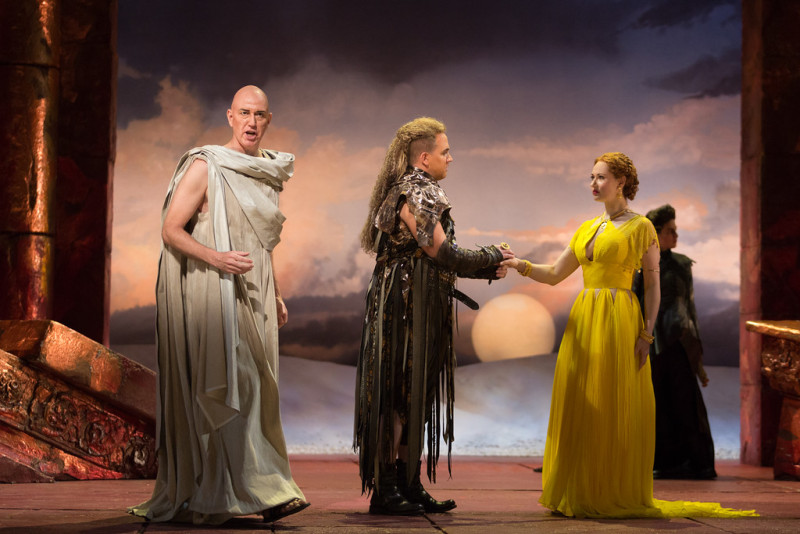‘Cato’ Buoys Reputation For Baroque
Review by PAT THORPE for www.allotsego.com

For more than 20 years, Glimmerglass Opera has brought baroque opera to life, convincing audiences that opera from the 17th and 18th centuries overflows with compelling drama and beautiful music. But even baroque enthusiasts were puzzled at the choice of “Cato in Utica,” by Antonio Vivaldi, for the 40th Anniversary season.
Vivaldi is a fount of melody in his familiar orchestral writing, but as an opera composer – he composed over 40 operas, mostly lost today – he strictly followed the opera seria formula. “Cato,” dating from 1737, was one of his big hits, in spite of having long stretches of recitative, no duets and no ensembles. Vivaldi’s music for Act I disappeared centuries ago, and the opera’s endings – there have been several – are an ambiguous muddle. Add a plot by Metastasio that defies reason and history and you might wonder if anyone could make this opera a success.
As the curtain rises, all doubts disappear. Set designer John Conklin has brought a soaring Piranesi ruin to the stage, glowing red and copper as if lit by the dying embers of the Roman Republic. Tazewell Thompson, bringing fresh vision in his debut as a baroque director, disposes of the opera’s first act by using an eloquent scrim to introduce the six characters during the opening orchestral sinfonia.
Cato is the Republic’s preeminent statesman, general, orator and Stoic philosopher; “I am Rome,” he declares. Revered for his incorruptibility, he is also arrogant, stubborn and an angry and abusive father. Thomas Michael Allen thoroughly embodies Cato, his imposing height and classical profile creating an indelible figure along with his impeccable baroque technique.
Julius Caesar has been Cato’s enemy for decades. Now that Pompey is dead, he alone of the triumvirate remains and he is on the verge of absolute power. Only Cato stands in his way. John Holiday has already seized power in the baroque world as the best young countertenor, and he easily conquers the audience with Caesar’s show-stopping battle aria, “Se in campo armato.”
Metastasio was more interested in love than war, so he manufactured romance in the midst of armed confrontation. Pompey’s widow, Emilia (Sarah Mesko, with a strong and wide-ranging mezzo), has vowed to take revenge on Caesar for her husband’s death; she seduces the Roman legate, Fulvio (Allegra De Vita, excellent in this pants role) to assist her plot. Marzia, Cato’s daughter (Megan Samarin, strong-willed but vulnerable), is secretly in love with Caesar but has been promised by Cato to Arbace (Eric Jurenas, an outstanding new countertenor), the ruler of Numidia.
Ryan Brown, founder of Opera Lafayette in Washington, D.C., conducts the expert small orchestra, including a talented continuo trio of harpsichord, baroque cello and theorbo. The music is glorious, filled with memorable melody and dazzling ornamentation; the performances are superb all around. And the finale is a stroke of dramatic genius, cutting through centuries of confusion with single deeply moving tableau. Glimmerglass has brought yet another forgotten treasure back to triumphant life.

